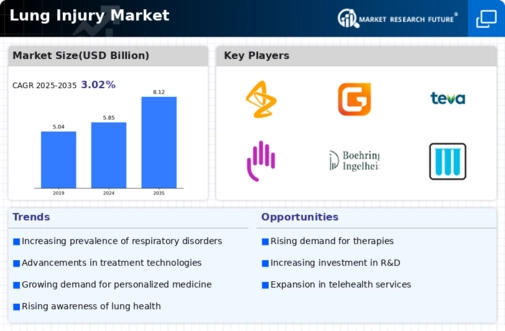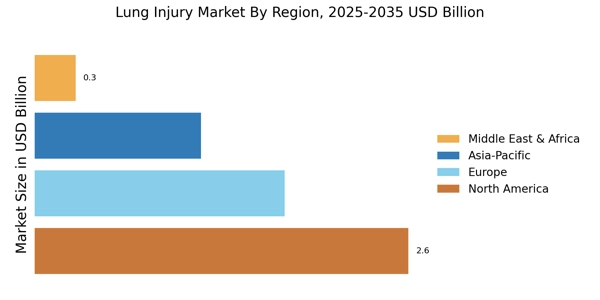Growing Geriatric Population
The aging population is a significant factor impacting the Lung Injury Market. As individuals age, they become more susceptible to respiratory conditions and lung injuries due to declining lung function and increased exposure to environmental factors. Market analysis indicates that the geriatric demographic is expanding, leading to a higher demand for lung injury treatments and management solutions. Healthcare systems are adapting to this demographic shift by developing specialized programs and therapies tailored to the needs of older adults. This trend suggests that the Lung Injury Market will continue to evolve in response to the challenges posed by an aging population.
Increased Awareness and Education
There is a growing awareness regarding lung health and the implications of lung injuries, which is driving the Lung Injury Market. Public health campaigns and educational initiatives are informing individuals about the risks associated with lung injuries and the importance of early intervention. This heightened awareness is leading to increased screening and diagnostic testing, which in turn fuels demand for treatment options. Moreover, healthcare providers are emphasizing the need for preventive measures, further contributing to market growth. As more individuals seek information and resources related to lung health, the Lung Injury Market is poised for expansion.
Rising Incidence of Lung Injuries
The increasing prevalence of lung injuries, attributed to various environmental and occupational factors, is a primary driver of the Lung Injury Market. Reports indicate that lung injuries are becoming more common due to exposure to pollutants, chemicals, and hazardous materials in workplaces. This trend necessitates the development of advanced treatment options and rehabilitation programs, thereby expanding the market. Furthermore, the rise in respiratory diseases, such as asthma and chronic obstructive pulmonary disease, contributes to the growing demand for lung injury management solutions. As healthcare systems adapt to these challenges, investments in research and development are likely to surge, fostering innovation within the Lung Injury Market.
Advancements in Medical Technology
Technological innovations in medical devices and treatment methodologies are significantly influencing the Lung Injury Market. The emergence of sophisticated diagnostic tools, such as imaging technologies and biomarkers, enhances the ability to detect lung injuries at earlier stages. Additionally, the development of minimally invasive surgical techniques and targeted therapies improves patient outcomes and reduces recovery times. Market data suggests that the medical technology sector is projected to grow substantially, with investments in lung injury treatments expected to rise. This trend indicates a shift towards more effective and personalized care, which is likely to drive the Lung Injury Market forward.
Government Initiatives and Funding
Government policies and funding aimed at addressing lung health issues are pivotal in shaping the Lung Injury Market. Various health organizations and regulatory bodies are implementing programs to enhance research, improve treatment accessibility, and promote preventive care. Increased funding for lung injury research is likely to lead to breakthroughs in treatment options and rehabilitation strategies. Additionally, government initiatives that focus on reducing environmental pollutants and improving workplace safety standards may contribute to a decline in lung injuries, thereby influencing market dynamics. The proactive stance of governments worldwide indicates a commitment to advancing the Lung Injury Market.


















